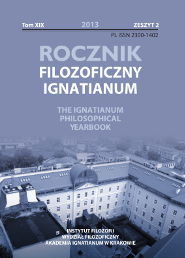The Naturalistic Fallacy - The Metaethical Source of the Controversy over the Naturalization of Epistemology
Abstract
In this paper I analyze the phenomenon known as ‘the naturalistic fallacy’. The thesis for which I argue is that the decision not to commit the ‘naturalistic fallacy’ (as taken by anti-naturalists), or to acknowledging it as an inevitable process (as in the naturalist position), forms the basis for every theory concerning the justification of normative judgments. It is this choice that determines what solutions can be proposed within the various fields of philosophy to the problems pertaining to the sources of justificational reasons and the criteria for justified judgment. To justify this thesis I draw an analogy between metaethical and epistemological versions of this ‘fallacy’. In the first part of the paper, I point to the metaethical controversy surrounding the ‘naturalistic fallacy’. In the second part, I transpose the controversy over ‘the naturalistic fallacy’ from the sphere of metaethics into that epistemology. Firstly, I adopt and seek to justify a chosen epistemic quality that, I argue, may be regarded as analogous to the ethical quality ‘good’. In order to accomplish this, I set out to determine the relation between the truth and the justification of a judgment, arguing that this second category is, in fact, the more important one where epistemological analysis is concerned. Although the ‘naturalistic fallacy’ was initially formulated within metaethics, it might be transferred to every field of normative consideration.
References
Alston WP (1985), "Concepts of Epistemic Justification", The Monist. (68(1)), pp. 57-89.
Atkinson RF (1961), "Hume on «Is» and «Ought»: A Reply to Mr. MacIntyre", The Philosophical Review. (70(2)), pp. 231-238.
Ayer AJ (1971), "Language, Truth and Logic" London Penguin Books.
Black M (1964), "The Gap between «Is» and «Should»", The Philosophical Review. (73(2)), pp. 165-181.
BonJour L (1998), "In Defense of Pure Reason: A Rationalist Account of A Priori Justification" Cambridge Cambridge University Press.
BonJour L (1985), "The Structure of Empirical Knowledge" Cambridge Cambridge University Press.
Brandt RB (1985), "The Concept of Rational Belief", The Monist. (68(2)), pp. 3-23.
Carnap R (1969), "Filozofia jako analiza języka nauki" Warszawa Państwowe Wydawnictwo Naukowe.
Cohen MF (1965), "«Is» and «Should»: An Unbridged Gap", The Philosophical Review. (74(2)), pp. 220-228.
Dancy J (1998), "Intuicjonizm", In Przewodnik po etyce. Warszawa , pp. 458-467. Książka i Wiedza.
Frankena WK (1952), "Obligation and Value in the Ethics of G. E. Moore", In The Philosophy of G. E. Moore. New York , pp. 93-110. Northwestern University.
Frankena WK (1939), "The Naturalistic Fallacy", Mind. (48(192)), pp. 464-477.
Hare RM (1952), "The Language of Morals" Oxford Clarendon Press.
Hospers J (1975), "Główne teorie metaetyczne", In Metaetyka. Warszawa , pp. 34-64. Państwowe Wydawnictwo Naukowe.
Hume D (1963), "Traktat o naturze ludzkiej" Warszawa Vol. 2 Wydawnictwo Naukowe PWN.
Jedynak S (1967), "Błąd naturalistyczny", Etyka. (2), pp. 289-297.
Kant I (1957), "Krytyka czystego rozumu" Warszawa Państwowe Wydawnictwo Naukowe.
Kim J (1994), "What is ‘Naturalised Epistemology’?", In Naturalising Epistemology. Cambridge , pp. 33-56. The MIT Press.
Kornblith H (1994), "Introduction: What is Naturalistic Epistemology?", In Naturalising Epistemology. Cambridge , pp. 1-14. The MIT Press.
MacIntyre AC (1959), "Hume on «Is» and «Ought»", The Philosophical Review. (68(4)), pp. 451-468.
Moore GE (1980), "Etyka" Warszawa Państwowe Wydawnictwo Naukowe.
Moore GE (1919), "Zasady etyki" Warszawa Wydawnictwo M. Arcta.
Morton A (2002), "Przewodnik po teorii poznania" Warszawa Wydawnictwo Spacja.
Niemczuk A (1998), "Przedmiot języka wartościującego", In Granice języka. Lublin , pp. 129-159. Wydawnictwo UMCS.
Nowell-Smith PH (1954), "Ethics" London, Baltimore Penguin Books.
Pigden CR (1998), "Naturalizm", In Przewodnik po etyce. Warszawa , pp. 468-479. Książka i Wiedza.
Platon (2002), "Teajtet", In Parmenides. Teajtet. Kęty , pp. 85-191. Wydawnictwo Antyk.
Pollock J (1987), "Epistemic Norms", Synthese. (71), pp. 67-95.
Putnam H (2002), "The Collapse of the Fact/Value Dichotomy and Other Essays" Cambridge Harvard University Press.
Reichenbach H (1960), "Powstanie filozofii naukowej" Warszawa Książka i Wiedza.
Scott-Taggard MJ (1961), "MacIntyre’s Hume", The Philosophical Review. (70(2)), pp. 239-444.
Searle JR (1964), "How to derive «ought» from «is»", The Philosophical Review. (73(1)), pp. 43-58.
Stevenson CL (1963), "Facts and Values. Studies in Ethical Analysis" New Haven, London Yale University Press.
Stevenson CL (1937), "The Emotive Meaning of Ethical Terms", Mind. (46), pp. 14-31.
Ziemińska R (2002), "Eksternalizm we współczesnej epistemologii" Szczecin Wydawnictwo Naukowe Uniwersytetu Szczecińskiego.
The Yearbook only accepts materials for publication that are free of all conflicts of interest, and that in no way involve conflicts over authorship, copyright, etc. The Editors will take action against any cases of plagiarizing, ghostwriting1, guest/honorary authorship2, etc. Where co-authored work is concerned, the Author listed first is expected to take responsibility for the submission, and is required to make clear the contributions of all of the Co-Authors involved. In the event of the publication owing its existence to funding dedicated to this purpose, this fact should be made clear: e.g. in any note of thanks/acknowledgement, or in a footnote, etc. Explicit notification should be given of any form of reprinting, with the appropriate evidence of permission to publish being furnished as required. Any impropriety on the part of Authors/Reviewers risks exposing them to appropriate responses from the relevant institutions.
______
1 This term refers to instances of a person who has made an essential contribution being omitted from the list of authors, or from notes conveying gratitude and/or acknowledgement.
2 This occurs when a person who has made either an insignificant contribution or no contribution at all nevertheless appears on the list of authors.





